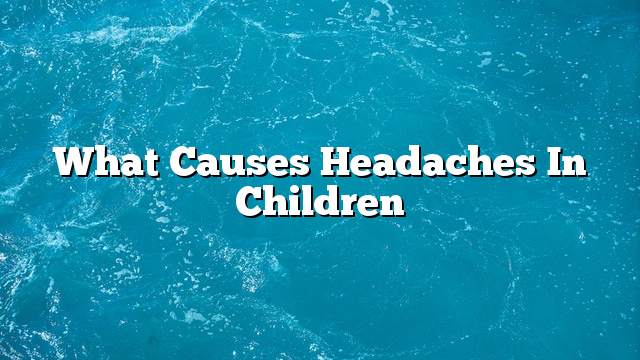Some children suffer from headaches and have several forms, including migraine headaches and tension headaches. It is normal that the child suffers from the headache of the day, which is suffered by adults and is as severe as adults, and the cause of headaches in children for many factors and are mostly accidental and disappear Headache with the demise of the effector.
Most of the symptoms that affect children at headaches are different from adults because of the large difference in causes of headaches and the treatment period in children is lower than that of adult adults.
Causes of headaches in children
- The constant tension in children due to going to school for the first time or nursery.
- Psychological stressors such as jealousy of the new child or of the older brother.
- Head injury.
- Fear, anxiety and insecurity.
- Exposure to the method of Sebba combing hair, especially girls and linking hair in a very harsh and tight.
- Inflammation and some diseases such as flu, colds, colds and sinusitis.
- Acute ear infections.
- Meningitis.
- Encephalitis, but this condition has some symptoms associated with headaches.
- Feel depressed, especially children who can not express feelings of sadness and loneliness.
Symptoms of headaches in children
- stomach ache .
- Continuous vomiting and ejaculation.
- Children get migraines from both sides, unlike adults.
- Sensitivity to sound and light.
- Strong and persistent crying in young children who can not express the whereabouts of the pain.
Methods of treatment of headaches in children
- Display the injured child to the doctor to determine the type of headache and give him appropriate treatment.
- Give the patient sufficient rest and quiet sleep.
- Give appropriate painkillers depending on the age of the child.
- If the child is a child who is allowed psychological treatment, it is best to present him to the psychiatrist to get rid of the problems of tension and anxiety.
- Give enough fluid.
- Stay away from the source of constant noise and disturbance.
- Develop a balanced diet containing essential vitamins and minerals.
- Stay away from TV screens and computer as much as possible.
- It is preferable to follow the instructions of your doctor or pharmacist when using powerful analgesics.
